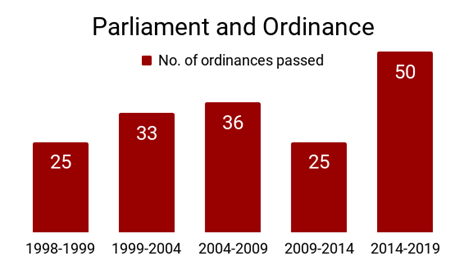About:
-
- Article 123 of the Constitution empowers the President to promulgate ordinances during the recess of Parliament.
- Article 213 of the Constitution empowers the Governor to promulgate ordinances when legislature not in session.
- These are temporary laws enacted by executive as against legislature.
- These have same force and effect as an act of Parliament, but are in nature of temporary laws.
Rationales behind Ordinances
-
- To address urgent and emergency situations
- To ensure legislative continuity
- To respond to national security threats, economic emergencies, or legal voids.
- To be responsive and adaptable to emerging situations
Evolution of Ordinances in India
-
- Government of India Act, 1861– Introduced the concept of
- Government of India Act, 1935- Power of ordinances granted to both the Governor-General and Provincial Governors
- Constitutional Assembly Debates (1946-1950)-R. Ambedkar defended it as a necessary tool for emergency situations but cautioned against its misuse.
- Trend after independence-
- First two decades- less number of ordinances
- During 1970s (Emergency)- Increase in the number of ordinances
- During 1990s– Increase in ordinances to highest level in terms of average number ordinances in a year.
- Coalition era– Decline in number of ordinances.
- Since 2014– Increase in number of ordinances

Pros and Cons of Ordinances
| Pros | Cons |
|---|---|
| • Enable the executive to act swiftly in emergencies • Bridge legislative gaps • Provide legal certainty and clarity • Ensure the responsiveness and accountability of executive | • Basis for bypassing legislative debate and scrutiny • Undermining democratic decision-making • Undermine the principle of separation of powers • Extraordinary situation can be subjective and hence prone to misuse |
Legality of repromulgation and Case Laws
-
- C. Cooper vs Union of India (1970)- Ordinances can be challenged in court if they violate fundamental rights.
- C. Wadhwa vs State of Bihar (1987)- Re-promulgation of ordinances without legislative approval is unconstitutional.
- Krishna Kumar Singh v. State of Bihar (2017)- The President’s satisfaction for promulgating an ordinance can be judicially reviewed. It ruled that an ordinance does not create enduring rights unless converted into law.




